 BUY IT FROM AMAZON: RIGHT HERE!
BUY IT FROM AMAZON: RIGHT HERE!
PLATFORM: XBox 360 (reviewed), PS3, PC
PRICE: $59.99
ESRB RATING: M
DEVELOPER: Irrational Games
PUBLISHER: 2K Games
Bioshock Infinite is a mess. A glorious, amazing mess.
Bioshock Infinite may be the rare case where a game is flat out TOO ambitious for its own damned good. The game’s greatest sins are born from the fact that Infinite is overstuffed with grand, wonderful, ballsy, dangerous ideas, the kind that influences generations of games to come. Infinite‘s cup floweth over with so much that when it follows one idea–granted, the most fascinating one–to the bitter end, the whole ends up frayed, underexplored, underdeveloped. A game leaving me wanting more is one thing. A game leaving me wanting more because it doesn’t fully satisfy what it starts is another.
The game has nothing but itself to blame, for having one of the most perfect, astonishing first acts constructed. Technically, it follows Bioshock 1‘s structure (for a very strong reason) where we are presented with the impossible, the beautiful, the serene even, and then stabbed in the heart when it becomes abundantly clear that the city is not what it seems.
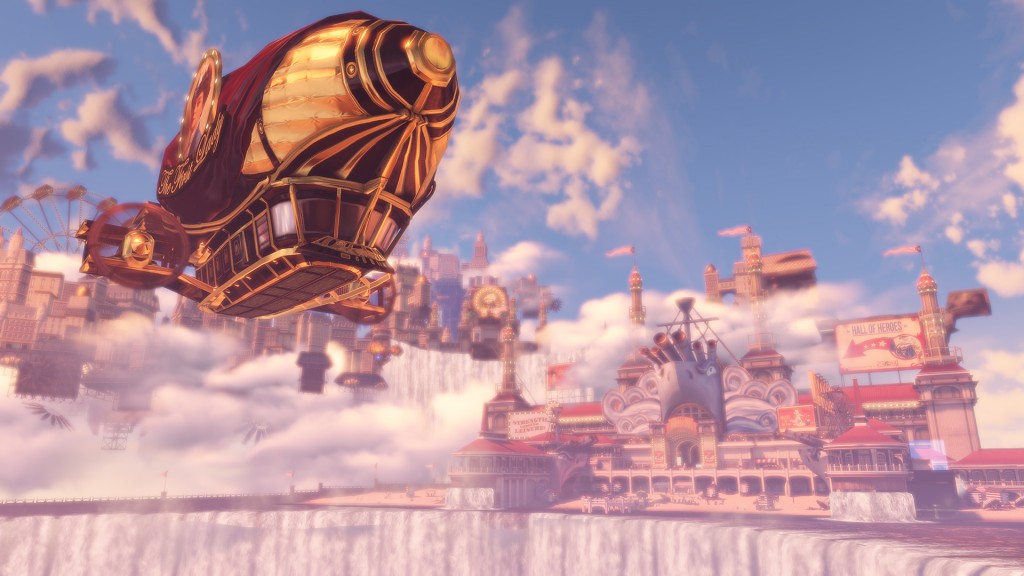 In the case of Columbia, it’s the fact that, like any utopia, the brighter the image, the darker the negative. Columbia is a more beautifully realized place than Rapture, working off steampunk tropes, but far more the idyllic far-gone golden memory of a 1912 that never was than any attempts at simple aesthetic cool. It is also ever more fucked up. Columbia is what would happen if you gave Jefferson Davis a DeLorean around 1866. Columbia is a theocratical state unto itself, seceding by ascending. Guns, god, and government are the law of the land. Blacks, Irish, and Chinese are separate and wholly unequal, kept as servants in the dark, behind the scenes of every technological marvel in Columbia if they’re not starving to death in its lower levels, and being vilified as subhuman by the rich and powerful.
In the case of Columbia, it’s the fact that, like any utopia, the brighter the image, the darker the negative. Columbia is a more beautifully realized place than Rapture, working off steampunk tropes, but far more the idyllic far-gone golden memory of a 1912 that never was than any attempts at simple aesthetic cool. It is also ever more fucked up. Columbia is what would happen if you gave Jefferson Davis a DeLorean around 1866. Columbia is a theocratical state unto itself, seceding by ascending. Guns, god, and government are the law of the land. Blacks, Irish, and Chinese are separate and wholly unequal, kept as servants in the dark, behind the scenes of every technological marvel in Columbia if they’re not starving to death in its lower levels, and being vilified as subhuman by the rich and powerful.
This, however, is not the story.
From below, is our hero, Booker DeWitt, who starts out on a boat, headed to a lighthouse, with one simple decree. to bring a mysterious “us” the girl, and a mysterious debt will be wiped clean. It’s up to him to infiltrate Columbia, and break her free.
This is also not the story.
 The girl is Elizabeth, who’s been locked in a literal ivory tower since birth, guarded by a giant steampunk bird. She is considered by the population a living savior, who will, one day “sit the throne, and set ablaze the mountains of men”. Upon meeting her, Booker finds that she has the ability to tear tiny holes in time and space itself. It seems to be the reason she’s kept under such heavy guard, and Booker now has the choice of sending her to New York to be captive again, or flying her to see the world she’s only read about in books, and this, too, is not the story.
The girl is Elizabeth, who’s been locked in a literal ivory tower since birth, guarded by a giant steampunk bird. She is considered by the population a living savior, who will, one day “sit the throne, and set ablaze the mountains of men”. Upon meeting her, Booker finds that she has the ability to tear tiny holes in time and space itself. It seems to be the reason she’s kept under such heavy guard, and Booker now has the choice of sending her to New York to be captive again, or flying her to see the world she’s only read about in books, and this, too, is not the story.
And yet, we spend most of the 15 hours Infinite takes on average to beat following these three threads. Each of these three stories is worthwhile, and told with visual and tonal bravado, the kind that would support ambitious AAA games on their own. For protracted moments, they do keep the game aloft, and part of why I forgave much in the moment came from the fact that, unlike the lion’s share of games in this genre, when I think about why it is I’m doing what I’m doing, not only do I have a clear answer, but one that makes me excited to get to its conclusion. The pieces, however, don’t fit. The game wants me to get invested in deciding to take Elizabeth to Paris instead of New York, then takes a sharp left where I’m expected to get invested in a lower-class uprising headed by an escaped black servant framed for murder, then swerve back to a 19th Century mystery, where Elizabeth’s parentage is in question. All three of these stories are rendered nigh upon meaningless in the face of the true story which, fascinatingly enough, only truly opens up after the game’s ending. I actually feel like a second playthrough is almost a necessity to fully embrace Infinite‘s fractured, inconsistent skeleton, and decide how much flak to give about these other plots going to go nowhere, but that’s a bit of a cop-out. Like any story, the game should stand on its own two feet the first time out, in the telling.
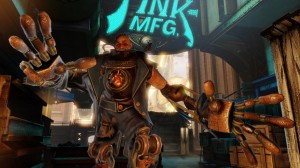 What about the playing though? All that is Infinite is built on a strong foundation of gameplay from its predecessors, tweaked mostly for the better. This game is much better at rationing out the player’s ability to heal or find ammo, supplying an actual challenge, whereas halfway through the first two games, your main character is Shiva, destroyer of waterworlds. Food and fuel for your
What about the playing though? All that is Infinite is built on a strong foundation of gameplay from its predecessors, tweaked mostly for the better. This game is much better at rationing out the player’s ability to heal or find ammo, supplying an actual challenge, whereas halfway through the first two games, your main character is Shiva, destroyer of waterworlds. Food and fuel for your plasmids vigors are abundant, specially with Elizabeth as such an amazingly balanced support character, but not unless you get the kills, hide in the right room, or use your gear correctly for the right situation. And even though it’s a gimmick that doesn’t permeate the game to nearly the degree I wanted, yes, getting into shootouts via skyhook is a fucking blast. This is the upside.
The downside is that what we want and expect from Bioshock has been infected with a heavy dose of modern FPS standards. You have regenerating shields, limited to two weapons at a time, and the wide, varied, options for killing enemies from the first are reduced. Skirmishes are less the imaginative supernatural plasmid brawls of the past, but straight up who-shoots-fastest-first firefights, with vigors as weapon mods more than the lightning-bolt-up-the-ass god of the elements you felt like in Bioshocks 1 and 2. Infinite is competent in this regard, but this game, this story, demands so much more.
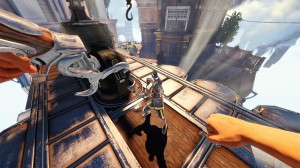 This, I think is the larger issue I have with Infinite. This game does NOT want to be a shooter. At least, not in the ways that it is now. Whereas gunplay and burning splicers alive felt like a necessary evil to survive in Rapture, the FPS brutality only works in Columbia in short bursts, when it has the most impact on disrupting the peace. The first major, incredibly brutal kills in Infinite work because they are cathartic, righteous, and completely disrupt the jaw-droppingly awful stage show the population was enjoying so innocently prior. After 10 hours of it happening consistently, though, when it doesn’t factor into Booker’s character or Elizabeth’s reactions outside of the first act, it loses its teeth altogether. Much later in the game, there’s a stage in a group home that’s the kind of thing that wouldn’t be out of place in Silent Hill, and it works primarily because, at that point, there’s no ammo to be had, vigors don’t do shit, and your main enemies are young boys with searchlights for heads, who alert the residents when you’ve fucked up trying to stealth around them. The most chilling, effective moment here involves a wheelchair with a mask in it, for Christ’s sake.
This, I think is the larger issue I have with Infinite. This game does NOT want to be a shooter. At least, not in the ways that it is now. Whereas gunplay and burning splicers alive felt like a necessary evil to survive in Rapture, the FPS brutality only works in Columbia in short bursts, when it has the most impact on disrupting the peace. The first major, incredibly brutal kills in Infinite work because they are cathartic, righteous, and completely disrupt the jaw-droppingly awful stage show the population was enjoying so innocently prior. After 10 hours of it happening consistently, though, when it doesn’t factor into Booker’s character or Elizabeth’s reactions outside of the first act, it loses its teeth altogether. Much later in the game, there’s a stage in a group home that’s the kind of thing that wouldn’t be out of place in Silent Hill, and it works primarily because, at that point, there’s no ammo to be had, vigors don’t do shit, and your main enemies are young boys with searchlights for heads, who alert the residents when you’ve fucked up trying to stealth around them. The most chilling, effective moment here involves a wheelchair with a mask in it, for Christ’s sake.
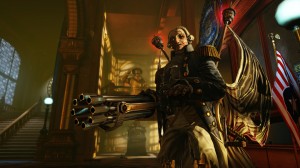 And in between, where I vividly remember tense, adrenaline pumping moments in previous Bioshocks (for all its faults, even Bioshock 2‘s final, cornered showdown is utterly spectacular at this), all the moments I think of from Infinite are just from Booker and Elizabeth exploring Columbia, talking to people, to each other. The one moment where having to shoot my way out of a situation is the one logical conclusion is during the opening minutes of a full-on, city-wide revolution, and even here, the moment I remember most is a little black girl singing CCR’s Fortunate Son in front of a gallows. Having my gun raised feels like it should be an option, not the core mechanic. But it isn’t.
And in between, where I vividly remember tense, adrenaline pumping moments in previous Bioshocks (for all its faults, even Bioshock 2‘s final, cornered showdown is utterly spectacular at this), all the moments I think of from Infinite are just from Booker and Elizabeth exploring Columbia, talking to people, to each other. The one moment where having to shoot my way out of a situation is the one logical conclusion is during the opening minutes of a full-on, city-wide revolution, and even here, the moment I remember most is a little black girl singing CCR’s Fortunate Son in front of a gallows. Having my gun raised feels like it should be an option, not the core mechanic. But it isn’t.
Is this enough to dislike Infinite, however? No. It’s enough to be generally disappointed in Infinite. It’s enough to make me question why Ken Levine needs Bioshock to be a shooter, when obviously, its heart of hearts lies elsewhere. Bioshock Infinite isn’t a great game, it’s several great ones, plus an okay shooter thrown in for good measure. Considering how the Infinite in the title comes into play later, feeling like I’ve played through several better games all at once almost feels appropriate.
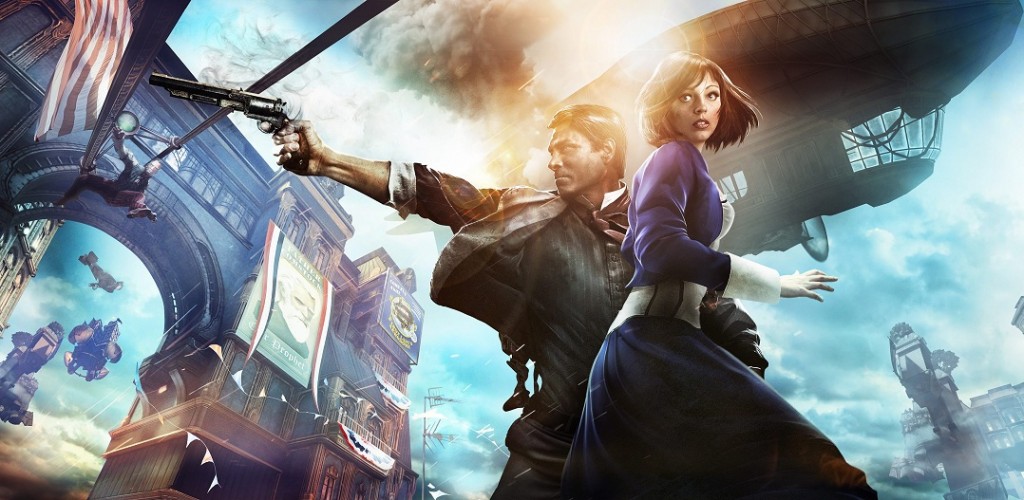




out of 5
